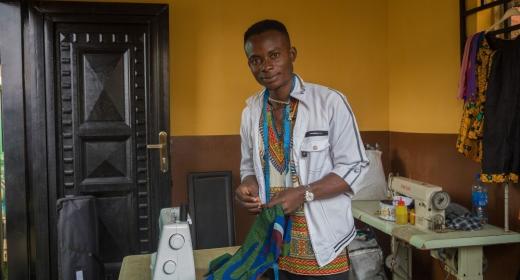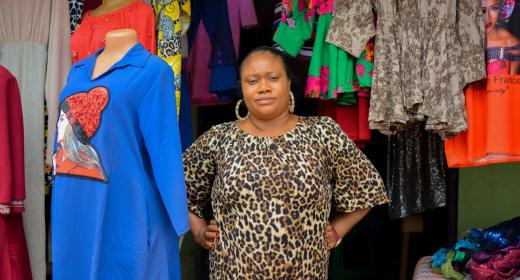Soap, perfume, textiles, shoes, food – these were just some of the products that were available to buy at the two markets in Lagos and Abuja in December. Anyone asking about the backgrounds of the people behind the market stalls would have learned that they had all benefited from support from the Nigerian-German Centre for Jobs, Migration and Reintegration (NGC). The NGC organises markets like these for former participants in its courses on vocational training and starting a business.
Young entrepreneurs win new customers
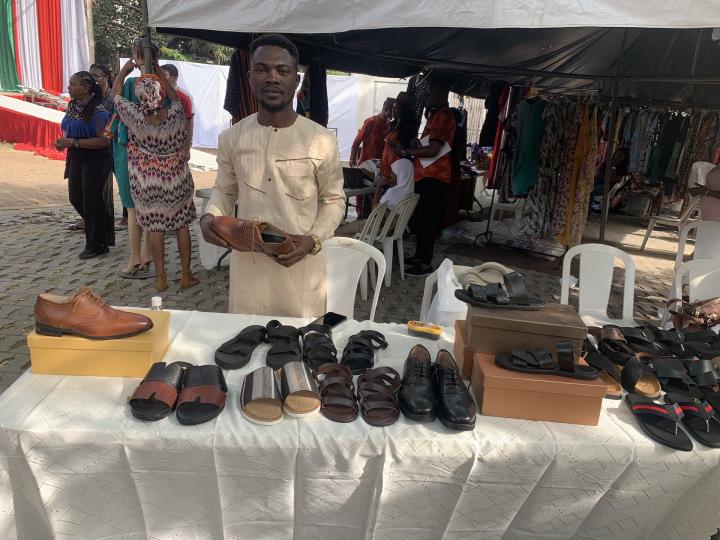
Young entrepreneurs win new customers
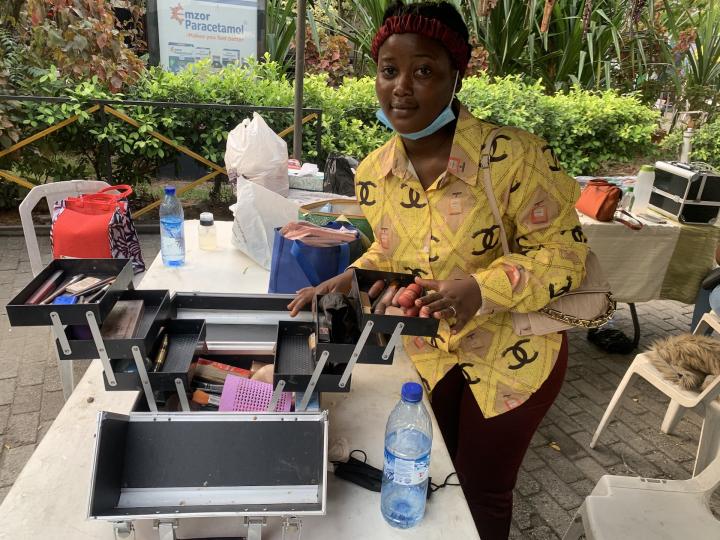
An opportunity for personal contact with customers
One of these former participants is Adewale. She’s in the right place at the right time, because there are lots of people who want to look good on their days off and are visiting her market stall in Lagos where she is selling her boxes of cosmetics. She had previously taken a cosmetics course organised by the NGC. “I’m really happy with the support I’ve been given”, she says. “The training course allowed me to discover my talent as a make-up artist.”
Over at Olalekan's stall, he is selling casual sandals and smart shoes for the office. He usually sells them mostly online. Olalekan is happy though, as the market is a great opportunity to meet his customers in person. He recruited customers for a bank before completing his NGC training as a shoemaker. Olalekan tells us that a reason behind the success of his shoe business, in addition to the training, is that the NGC provided him with tools like sewing and grinding machines. The NGC funds the training of young Nigerians, and often provides them with the tools they need for starting their businesses. “If I hadn’t had this opportunity to learn shoemaking, then I’d probably still be walking the streets of Lagos trying to find customers for the bank”, says Olalekan.
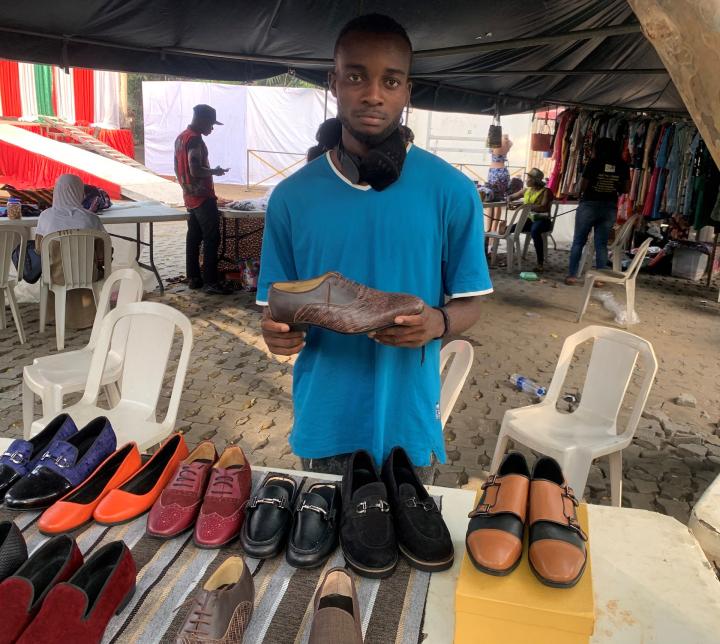
Doing good business at the market
Just like Olalekan, Success also works in the shoe business. Today, this former barkeeper is also running a stall at the market. He lost his job during the COVID-19 pandemic, but successfully completed a training course as a shoemaker. The training course turned him into an expert, he proudly states: “There isn’t a single type of shoe that I can’t produce.” This is now the third market organised by the NGC which Success has taken part in. He has sold a lot of shoes each time, he reports.
And he isn’t the only one to sell a lot of products at the market. Benjamin has also been very busy. He is selling shawarma, a Middle Eastern meal made from meat cut into thin slices that is very popular in Nigeria. Benjamin is impressed by the sales he's made and the amount of orders he has had at the market. “Here we’re grilling one shawarma after another,” he says. “At one point the orders even started to pile up.” The NGC gave Benjamin help and support with setting up his shawarma snack bar, which he operates in the west of Lagos.

This link opens a YouTube video. Please note the data protection regulations valid for this site.
ConfirmThese markets provide sustainable support
Events like the markets in Lagos and Abuja show that the NGC continues to support its young entrepreneurs, even after they have started their businesses. “These markets help improve the participants’ businesses”, says Sandra Vermuijten, manager of the NGC. They are an opportunity for the participants to present their work to a wider audience and achieve good sales.
The fact that the goods and services are of high quality can be seen from the high number of visitors. “These are outstanding products that say a lot about the Made in Nigeria brand”, Vermuijten believes. She describes the shoes made by Olalekan and Success by saying: “These shoes are comfortable and well made. The end products are in great demand due to their good quality.” In turn, this also reflects well on the NGC programme. Regarding the programme, she goes on to explain: “As well as the technical skills, we also teach business management and entrepreneurial skills as part of our courses because both skill sets are necessary.”
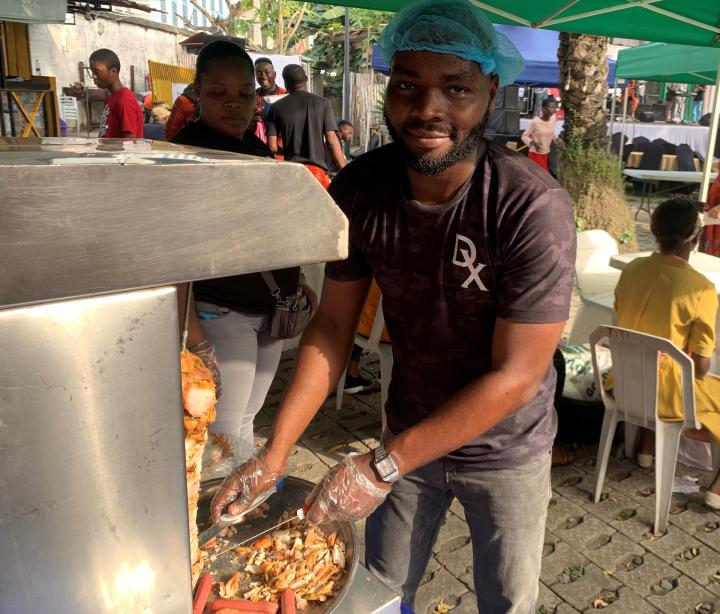
More than just an opportunity for making sales
The participants are already looking forward to the next market: “It’s not just about selling our shoes here, making business contacts is just as important. If we don’t sell the shoes here, then we can sell them later on because we’ve made the right contacts,” Success explains. Benjamin also uses the market to distribute flyers for his shawarma snack bar, for example. Vermuijten is certain that these special markets will be organised more frequently in the future. The plan is also for them to last two days instead of just one day as before.
The markets aren't just a chance to buy and sell goods or make contacts. Healthcare is also on offer there. Women were offered free cervical cancer screening at the Christmas market in Lagos. This is a valuable service, because early screening can save lives. “Healthcare shouldn’t just be something that happens in a hospital, it can also be part of a communal experience and something that’s enjoyable. We don’t need to worry if we have regular health checks”, says Sandra Vermuijten. Another market is planned for the Easter holidays.
As of: 02/2022

